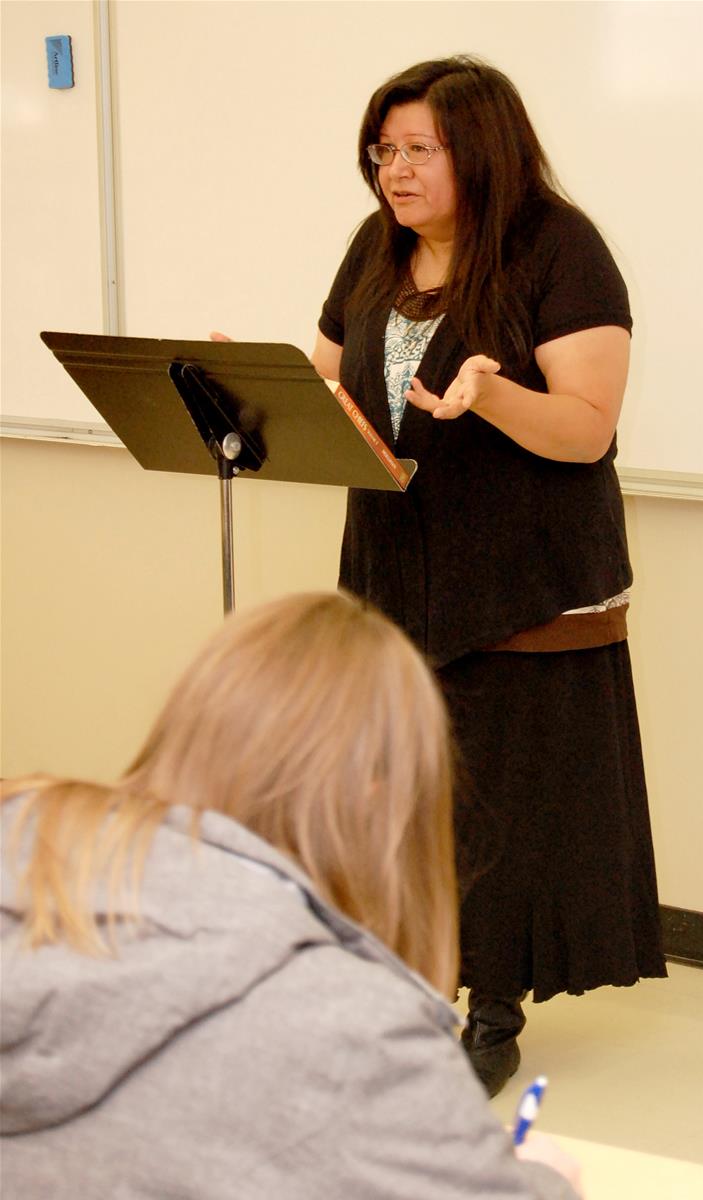Caronport High School students learn that healing needs to continue for Aboriginal peoples

On a reserve, in a cabin that was tucked away by a lake just north of Prince Albert, Joy Desjarlais’ family was about to be torn apart.
The year is 1960 and the sixties scoop is about to take place- a time when Aboriginal children were forcibly taken and placed into foster homes and residential schools.
“We had a wonderful life. It was very peaceful. My parents had nine boys and tried and tried for the longest time to have a girl. They finally had their little girl and that girl was me,” Joy Desjarlais, Aboriginal awareness public speaker, said.
“But when (I) was six months old, social workers and RCMP officers surround the home and forcibly removed all the children. By midnight (we) were placed in a foster home and eventually separated.”
Desjarlais took a moment to compose herself after being overcome with emotion. The Grade 11 and 12 students she was speaking to at Caronport High School waited for her to continue.
“Sometimes it hits home and hurts so much. Imagine yourself as being 5 years old and you are playing in your yard. Your parents are at home and all your brother and sisters are there. Everything is happy and all of sudden the police show up, they grab you, they put you in their cars and take you away. You cry and you fight and they say, ‘no you are not going home, you will never see your family again. You will never see them at Christmas time, you will never see them at your birthday, so just get it out of your head because you are not going to see them again,’” she explained.
“Will you be adopted with your siblings? Probably not. Will you go into the same foster home as your siblings? Probably not. When you grow up and discover at the age of 18 no one was looking for you because your parents don’t know how to find you or they committed suicide or they drank themselves to death, how do you think you are going to feel?”
It is a reality that many of the sixties scoop children have had to deal with, and is one of the many reasons that Aboriginal peoples have turned to drugs and alcohol Desjarlais said.
“It is tough. So much has happened and I want people to understand. People often say for us to just get over it, but it isn’t that easy when you know everything we have been through,” she explained.
Things like being forced off their land and into residential schools.
“I won’t say too much about residential schools because there is still a lot of bitterness and hurt, but the kids were severely, severely abused in every single way, sexually, physically, and mentally. They were completely and utterly destroyed emotionally,” she explained.
“And when the government forced our people onto reserves they had to learn how to farm the land. Only, they were given seed that was no good to farm with, they were given oxen that were either too old to till the ground or oxen that were wild and couldn’t be handled, and they were given broken machinery by the government.”
She explained by giving them inadequate supplies it was hoped they would eventually die out.
“But look at us today,” Desjarlais said. “We are still here.”
She now hopes to bring hope and identity back to her people by sharing the love of Christ with them, but it comes as a challenge.
“It is not easy for that person who came out of the residential school who was beaten day after day, who was raped day after day by these priests and who was beaten by nuns all in the name of Jesus. Nobody wants hear about God. You can hardly mention the name Jesus when you go to a reserve. They don’t want to hear about that because of the past, because of the history,” she said.
Desjarlais said she is grateful that, while she has had a hard past, she knows the love of Christ and is learning to forgive on a daily basis. An opportunity she has been given because at the age of five she and one of her older brothers were adopted into a loving, Christian home.
“My adopted parents came from Germany. It is amazing how God brings a couple in love from Germany to Canada and a baby from up north who has been apprehended all together,” she said.
“I thank God that I have Jesus in my life because I was able to forgive and I was able to do something with my life.”
It is a different reality, though, for the rest of her brothers.
“All the rest of (my) brothers stayed in the foster care system and grew up there. They all ended up turning to alcohol to deal with all the issues they had. To this day, out of the nine brothers I had, I only have two left,” she explained. “It’s been a real struggle to see brother after brother after brother die and have to go to their funerals.”
Despite the obstacles and hurts she has had to face in her life, Desjarlais continues to move forward building awareness and praying for healing within her peoples.
“I really feel understanding how to minister to Aboriginal people is the whole point of talking about our history. I want us to be challenged,” she said.
“I want us to feel empowered and excited to think about some ideas about what we can do to share the love of God with people who have been through such atrocities.”
